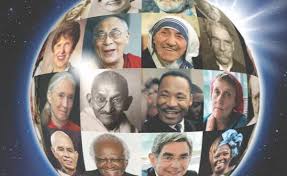Fifteenth Sunday in Ordinary Time
“And who is my neighbor?” Lk:10:29
Is there a more pertinent question in America today than: Who is my neighbor?
Sadly, we are a divided people. We are a nation torn apart.
Perhaps the cover of a recent Time magazine paints the picture best. On it, set upon by a starkly black backdrop, a single question is asked:
Why Did They Die?
And then we see the names and ages of the 49 victims of the madman who attacked them at a night club in Orlando, Florida. As the article commenting on this horrific tragedy states: “The 29-year-old killer came to send a message, as all terrorists do.”
The message, of course, is one of hate and fear.
“The killer,” as Time went on to say, “attacked in a season of turmoil as voters considered an election that was fast becoming a national referendum on the country’s very identity, its commitment to pluralism and its role as a beacon in the world.”
Time further reminds us that previous terror attacks in our country have always been responded to with a “tradition more discriminating than the pipe bomb, more powerful than the long gun.”
When four girls were killed in 1963 in a Baptist church in Birmingham, Alabama, our country responded by passing the Civil Rights Act. “The hijackers of 9/11 brought out firefighters who raced up stairs as buildings collapsed. Charleston, S.C, responded last year to the murderous rampage of a white supremacist with a miles-long chain of brotherhood, while maimed runners on prosthetic legs returned to Boston to rekindle the spirit that bombers had tried to destroy. Unity and hope swamped fear and hate each time.”
Time then concludes with this judgment: “The terror this time did not unite. It tore.”
Perhaps like never before, we – a country which prides itself on being a “Christian nation” – need to carefully and prayerfully ponder the answer to the question posed to Jesus in today’s universally acclaimed story of the Good Samaritan:
“And who is my neighbor?”
This is a central question in the church today, as well as in our entire society. It’s a question that is asked in conversations around our immigration policy. It’s a question often raised in our discussion of race or sexual identity. It’s a question that is pondered in interreligious and ecumenical relationships. And certainly it’s a question frequently addressed in the political sphere, especially during this election year.
So let’s look prudently at what really is at the heart of Jesus’ message in this story.
To begin with, it’s important to remember that Jesus uses a story to make his point, not a lecture or a treatise complete with footnotes. And, it’s not just any story, but one specifically designed to be delivered to someone who thinks he has life all figured out – a scholar of the Law, a legalist.
Jesus then chooses to make a Samaritan the centerpiece of the story. This in itself would be startling to the legalist because there was a long and deep animosity between the Samaritans and the Jews. How would it be possible that someone from Samaria, someone of his kind could know anything about neighborliness?
Then, using fifteen verbs, Jesus gives a detailed rendition of the extraordinary accomplishment of the Samaritan: he “pours oil and wine over his wounds;” he “bandages them;” he “lifts him up on his own animal;” he “took him to an inn and cared for him;” he “takes out two silver coins and gives them to innkeeper with the instruction, ‘Take care of him.’” And, as if this were not enough, the Samaritan then says to the innkeeper: “’If you spend more than what I have given you, I shall repay you on my way back.’”
Jesus then asks the inevitable question – one that each of us has to answer as well: who was the “neighbor” to the robber’s victim?
Even the scholar of the Law cannot miss the point. The “neighbor” is the “one who treated him with mercy.”
This is the answer that changes the entire worldview of the lawyer. No long lecture is needed. No elaborate definition is required. The story tells it all: Mercy is not concerned about the color of someone’s skin or their sexual identity or their economic status or their political beliefs or their religious identity.
Mercy is what God shows to each one of us. Mercy is what we are to show to each other. “Be merciful as your heavenly father is merciful.” Lk. 6:36
Today’s gospel account begins with the question: “what must I do to inherit eternal life?” What the gospel’s story tells us is that mercy – boundless mercy – is the answer. It is not only the answer to our life hereafter, it is the only resolution to the dilemma of what will ultimately heal the terrible divisions we are experiencing.
We are all in this together. We need to be and have “neighbors” like the Good Samaritan. It’s what our “Christian” country has to remember and take to heart if we are ever to heal the appalling divide that is tearing us apart.
Or, as the brother of one of the victims of the Orlando tragedy put it: “All I want for people to take away from this situation is this is literally a war we are fighting, between love and hate. I just need everyone to love. Just give so much love.”
Like the Good Samaritan did.




